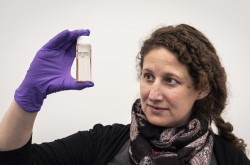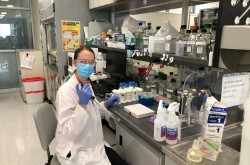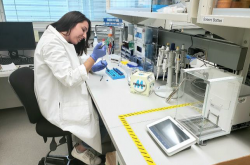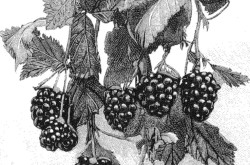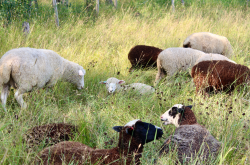“Magic” cow produces milk that may be easier to digest

A cow named Magic at the Canada Agriculture and Food Museum has distinguished herself from the rest of the herd – by testing positive for a special form of beta casein protein that may make her milk easier to digest.
Magic — one of two Guernsey cows in a herd of 60 — was tested earlier this year by the Canadian Guernsey Association.
“It’s a gene test – you just pull hair and you can test the DNA,” explains Jennifer Russell, a herdsperson for the museum, which is a working farm in Ottawa. Russell says the test results revealed that Magic is producing what’s known in the dairy industry as “A2 milk,” which has been enjoying an increased popularity in Canada and other parts of the world.
According to a paper about A2 milk — published by the Canadian Dairy Network (CDN) in 2016 — the genotype of dairy animals is expressed as either A1A1, A1A2, or A2A2, with each copy of the beta casein allele leading to the production of the corresponding type of beta casein. A2A2 cows are the only ones that can be considered producers of “A2 milk” since A1A2 cows will produce milk with a mixture of A1 and A2 beta casein.
Rob Forster, a fieldman for the Canadian Guernsey Association, explains that the majority of cows produce either A1A1 or A1A2 – which is what most consumers are buying in stores. Guernsey cows are one of the breeds with a higher frequency of the A2A2 genome.
Forster says the Canadian Guernsey Association considers this an advantage because there’s a growing belief that A2 milk may be easier for people to digest.
“Right now, a lot of people envision ‘milk is milk is milk’ which really isn’t the case,” says Forster. He adds he’s heard anecdotal accounts of A2 milk improving human health conditions including Irritable Bowel Syndrome (IBS), skin rashes, and hayfever.
For some individuals — the CDN points to studies that suggest up to 25 per cent of people — a perceived lactose intolerance may in fact be a sensitivity to one of the proteins that are released upon the digestion of A1 milk.
“A proportion of people who believe they have a lactose intolerance might be sensitive to A1 beta casein,” writes Lynsay Beavers and Brian Van Doormaal in their CDN paper. “One human study showed that more gastrointestinal discomfort occurs following the consumption of A1 milk compared to A2 milk.”
Outside of Canada, companies have already started to capitalize on an emerging niche market for A2 milk. A New Zealand-based company, the a2 Milk Company, licenses and markets all A2 products. These products — sold in Australia, China, and the United States — sell for about the same price as organic milk.
Here in Canada, some small producers are starting to market A2 milk under their own labels; they cannot use “A2” in product names because of copyright restrictions from the a2 Milk Company. One such small supplier is Eby Manor – a Guernsey farm located in Waterloo, Ontario. Eby Manor sells Golden Guernsey Milk — and a number of other dairy products — from its on-site market, and distributes its products in the Greater Toronto Area, Guelph, Hamilton, and Ottawa.
While the A2 phenomenon has not yet infiltrated the mainstream, public consciousness, Forster believes that could soon change.
“It’s starting out as a niche market, but at some point this could become mainstream if it’s advertised and promoted correctly,” he says. “I think there’s more and more people out there that have certain issues with respect to digesting milk; the A2 is not a cure-all, but it’s an option.”





















